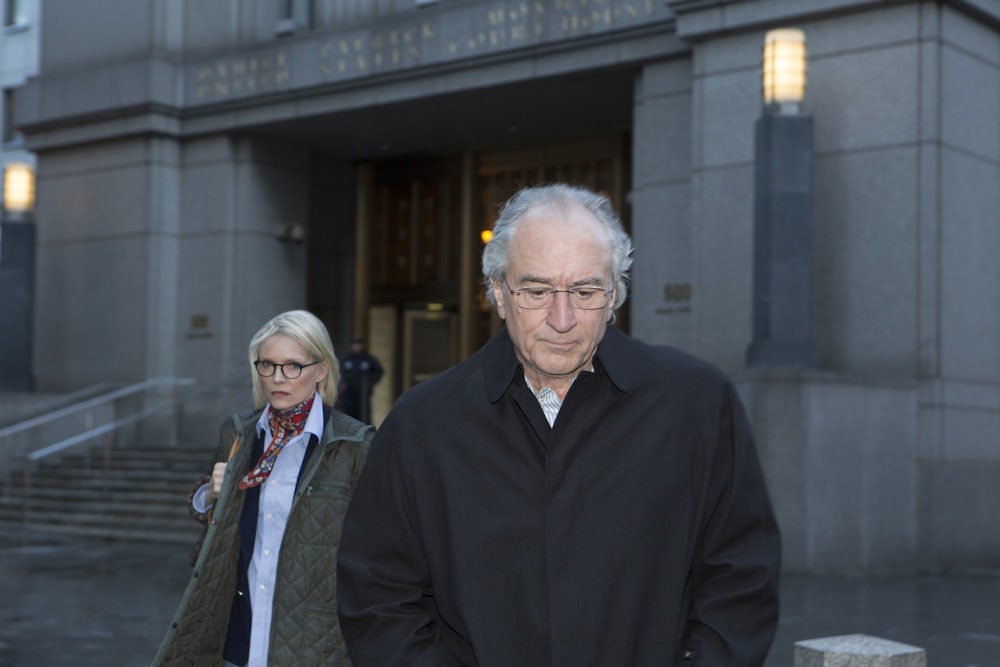Robert De Niro has been in some bad comedies in recent decades, but there’s no altering the fact that he is one of Hollywood’s great treasures. Now he’s back, in HBO’s The Wizard of Lies, doing what he does best: playing a gangster who is difficult to get a moral read on. White-collar the crime may be, but Bernie Madoff is a character cut straight from the mob-flick tradition.
Michelle Pfeiffer, meanwhile, is one of cinema’s most compelling molls. There’s something very similar between the characters of Madoff’s wife Ruth and Elvira Hancock in Scarface (1983). Neither woman smiles, ever, and their blonde hairdos look like helmets designed for defense. Both women have knifelike bodies which communicate the combination of strength and fragility that is the definition of the word “brittle.”
The Wizard of Lies tells the story of the Madoffs’ unravelling, from the day that Bernie has to break the news of his vast Ponzi scheme to his sons Andrew and Mark (Nathan Darrow and Alessandro Nivola), to Andrew and Mark’s eventual death and Bernie’s estrangement from his wife.
The question of whether the sons are really innocent animates the plot—much as it animated public coverage of the case in real life—but it is eclipsed by the portrait of the Madoffs’ marriage. Bernie was, we hear, a lifeguard when they were teenagers. Every day that summer, Ruth laid out on the beach, guarding her lifeguard from the attention of other girls.
Pfeiffer is perfectly cast as the wife who slowly realizes the deliberateness with which she avoided learning anything about her husband, his business, her complicity in it all. “What’s a Ponzi scheme?” Ruth asks in an early scene. When her hairdresser of 15 years refuses to keep Ruth on as a client, we see the reality of her husband’s crimes finally hit home.
As Ruth’s role in the financial crimes comes under scrutiny, the couple discuss their past together. Ruth expresses exasperation at the way the investigators assume her guilt. Bernie agrees, saying she was never involved. She recoils, and he has to placate her by acknowledging that, yes, she did do the bookkeeping for a year in the 1960s. But she was “no mastermind,” Bernie says. “Gee, thanks,” she responds.
When Bernie gets out on bail after the big arrest, the pair attempt suicide together. They go around the house collecting her housewife-y secret stashes of Ambien. Bernie can’t sleep without the TV on, and Ruth grouses that they’re going to spend their last night on earth under the gaze of Judy Garland. She curls into his body and draws the sheet up.
Michelle Pfeiffer hasn’t worked in television since 1996’s Muppets Tonight, which just goes to show how much things have changed for HBO. The grinding music and the dour blueish lighting betray director Barry Levinson’s ambitions to make this into a David Fincher movie, but you barely notice these derivative features because Levinson has been mostly successful. Aside from the excellent casting for the two leads, Levinson has chosen his scenes from the family’s life well.
In advance of a big family party, Bernie, standing in a bathrobe, with the Florida beach behind him, moves his hand up and down in the air, indicating what volume he wants his music to be played. A lackey makes adjustments to the song, which is “The Great Pretender.” Bernie acts like an asshole to the staff all the way through the party, and forces Andrew to eat lobster when really he wants to eat duck (after having, of course, sent the lobster back to be served differently under a hail of recriminations). But we also see Ruth in her son’s arms, dancing to “Sweet Caroline,” before the whole family huddles and does that dumb, wonderful arms-around-the-shoulders thing that we all do on dancefloors at weddings.
Within the marriage, Bernie’s own personality holds the core of The Wizard of Lies. As in life, Madoff’s embrace of his guilt paradoxically makes his victims feel hard done by. It’s hard to rage at a man who apologizes so much. It’s especially infuriating when—as this movie displays at great length—Madoff negotiates his way through confession with the same aura of “trustworthiness” with which he committed his crimes.
De Niro delivers an extraordinarily coherent performance of a man riven by contradiction. In one scene, at a big, fancy cocktail party where a jazz drummer is playing a solo, Madoff’s business is tanking, and he needs money badly. But when a rich guy comes up and offers to invest $100 million, Madoff says no. His investor list is closed, he says. Despite the enormous pressure he’s under, he plays this guy like the drummer. As percussion thrums through the scene, Madoff talks this anonymous party guest up to a $400 million investment, cool as a cucumber.
Does that make Bernie Madoff a psychopath? I don’t know: Did the vigilante violence of Taxi Driver make Travis Bickle a psychopath? It would be a mistake to suggest that The Wizard of Lies is close to Scorsese’s film in terms of quality—none of the actors besides De Niro and Pfeiffer are worth looking at twice. But De Niro has approached the role of Bernie Madoff with an evenhandedness, even a minimalism, that places his performance among the greats of his career. The Wizard of Lies is a movie with a terrible name and some mediocre aspects. But great central performances from two icons of the silver screen make it necessary watching: The screen is smaller this time, but this is the kind of story where De Niro and Pfeiffer belong.
